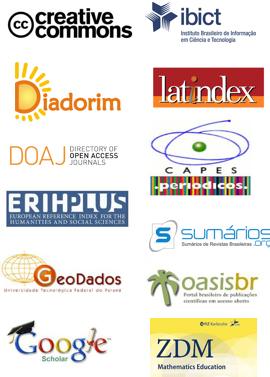Medidas de Tendência Central de um Conjunto de Dados: Conhecimento e Desempenho de Futuros Professores dos Primeiros Anos
DOI:
https://doi.org/10.17921/2176-5634.2022v15n2p125-131Resumo
Resumo
Numa sociedade cada vez mais exigente torna-se essencial que os cidadãos desenvolvam capacidades e competências que lhes permitam, entre outras situações, serem capazes de interpretar e analisar informação que lhes chega através de diversas fontes de informação. Neste sentido, o ensino e aprendizagem da Matemática, em particular da Estatística, configura experiências de aprendizagens fundamentais ao desenvolvimento de uma literacia matemática (e estatística) adequada. Esta investigação tem como objetivo aceder ao conhecimento estatístico de futuros professores dos primeiros anos e perceber quais as suas dificuldades e eventuais lacunas na aprendizagem estatística. Assumimos um paradigma interpretativo e desenvolvemos uma investigação-ação. Os participantes foram os estudantes do 2.º ano do curso da Licenciatura em Educação Básica, que frequentavam a unidade curricular Análise de Dados. Os dados foram recolhidos por meio de um instrumento de avaliação do conhecimento estatístico (aplicado no início e final da unidade curricular), observação participante, conversas informais e protocolos dos estudantes. A análise dos desempenhos dos estudantes no instrumento de avaliação do conhecimento estatístico permitiu aceder e identificar as lacunas no conhecimento dos futuros professores relativamente a medidas de tendência central de um conjunto de dados e adaptar as práticas de sala de aula, por forma a (re)construir os conhecimentos estatísticos, atribuindo-lhes significado para os estudantes e futuros professores.
Palavras-chave: Conhecimento Estatístico. Formação Inicial de Professores. Medidas de Tendência Central.
Abstract
In an increasingly demanding society, it is essential that citizens develop abilities and competencies that enable them, among other situations, to be able to interpret and analyze information that comes to them through different sources of information. In this sense, the teaching and learning of Mathematics, in particular Statistics, configures learning experiences fundamental to the development of an appropriate mathematical (and statistical) literacy. This research aims to access the statistical knowledge of future first-year teachers and to understand their difficulties and errors in statistical learning. We assumed an interpretive paradigm and developed an action-research project. The participants were the 2nd year students of the Undergraduate Degree in Basic Education, who were attending the curricular unit Data Analysis The data were collected using an instrument for assessing statistical knowledge (applied at the beginning and end of the curricular unit), participant observation, informal conversations and students’ protocols. The analysis of the students' performances in the statistical knowledge assessment instrument allowed accessing and identifying the errors of the future teachers’ regarding the knowledge about the central tendency measures of a set of data and adapting classroom practices, in order to (re)construct statistical knowledge, assigning meaning to them for students and future teachers.
Keywords: Statistical Knowledge. Pre-Service Teacher Education. Measures of Central Tendency


